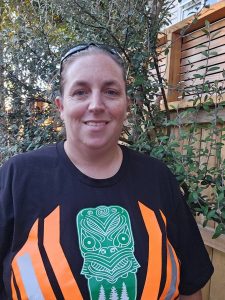
Tania Gibb
Eastland Wood Council (EWC) joined forces with WorkSafe, Competenz and various industry stakeholders to create a course aimed at empowering women working in the region’s forestry industry to enhance the safety standards in their organisations.
The council funded 12 Tairāwhiti women in forestry to upskill and complete New Zealand health and safety qualifications. After completing the Level 3 health and safety programme, 10 of the graduates have now stepped up to the Level 4 programme.
Tania Gibb, co-owner of Rā Whakapono Logging in Gisborne is one of them. She is now thankful that she and husband Irvin forged ahead with starting the business and committed to rolling out best practice for Rā Whakapono’s health and safety processes “Forestry health and safety can be a scary thing if you don’t do it right. If we were looking for a reason not to have started our business two years ago, health and safety compliance would have been it,” she says.
EWC Health, Safety and Training committee chair, and acting head of the Women in Tairawhiti Forestry group, Jessie Bourke, says the collective commitment of the group stakeholders to launch the course highlights the industry’s commitment to fostering inclusivity, professional development, and a culture of safety.
“By giving so many women the opportunity to attend, we have instantly driven up the health, safety and wellbeing knowledge within small businesses in our community – arguably the most high-risk industry here on the East Coast. That has to be a win for women and for our communities,” Bourke says.
“The courses are staged and flexible to work around the demands of running a small business. If more courses could be offered in a variety of different manners this goes a long way to break down the access barriers for women.
Rā Whakapono Logging has a team of 11 staff, and Gibb has already earmarked a team member for the nationally recognised Level 3 and Level 4 training.
“We already have someone on our team who I would like to put through the same training. They have long experience in forestry and already take health and safety very seriously. The qualification will enable us to keep the high standards in the bush, as I am not there.
“It’s important to lead our team to build an understanding of the changing health and safety legislation—because everyone is more open to following the rules if they understand why we are doing it.”
She says the business has always been focused on work-based learning. “With 20 years of experience as a logger’s wife and hearing stories from the sector, we have been able to reflect on what’s important in the sector—training and retaining staff is at the top of our list and comes before profit.”
She has seen a welcome shift in how health and safety is perceived in the industry and believes crew behaviour changes for the better when there is a female influence in the team. “This applies from management to the forest,” she says.
“Before we started our business two years ago, we could see contractors accepting jobs without a full understanding of the health and safety risks involved with them.
“Now people are more open to talking about what is working, what possibly needs improving and how to put in place the necessary building blocks that will provide a safer working environment.
Gibb welcomes more industry-driven initiatives like this one. “Training our people, especially women, inspires positive change and drives meaningful impact for forestry.”
“Women are underutilised in forestry. I was already running the health and safety in our business, if a little blindly. I know there are other forestry businesses in the same boat – female employees and co-owners who are also the health and safety reps who can fill this gap in their business. More women could be empowered and recruited into these programmes.
“Health and Safety training opens the door for women in forestry. Some may prefer to work hours that are suited to family life—not getting up at 4am when the crews start—and for me, the programme has allowed me to do my bit for our family business, as I can’t drive the machines.”
Competenz Training Advisor Steven Jones organised the courses. He has witnessed significant changes in forestry safety.
“The women completing the course have their eyes open to understanding the entire health and safety process, from preparing their teams to be aware of their surroundings to not having laces on their boots to doing the paperwork if an incident investigation is required.”
Steven says the professional development programme equips women for career advancement, while positioning them as valuable contributors to the industry.
“They are gaining the tools to improve safety in their workplaces and long term, they can move from one organisation to another, carrying over what they have learnt while lifting the health and safety standards in a new work environment.”





